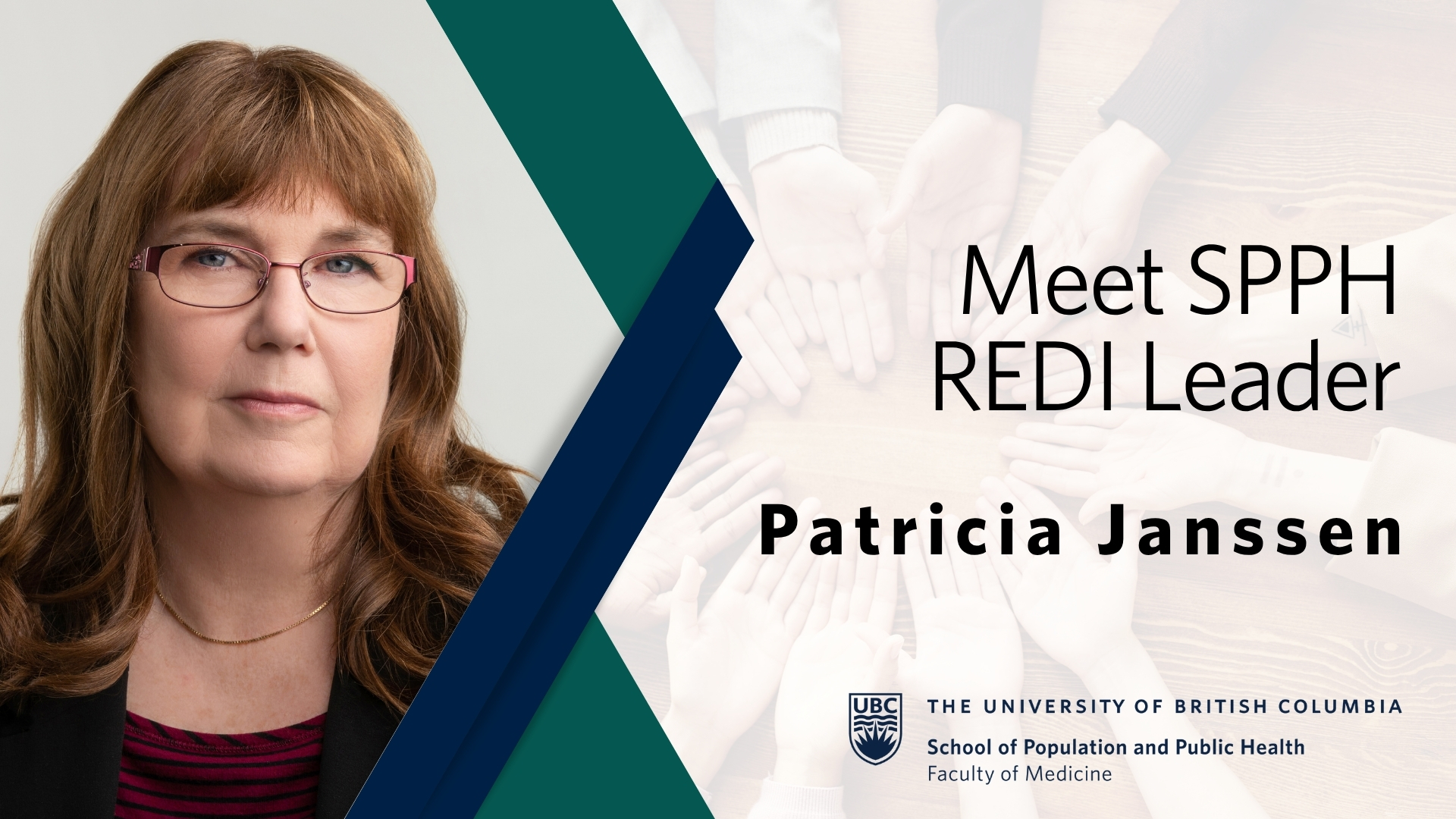
In this REDI Leader spotlight, we speak with Patricia Janssen, Professor at the School of Population and Public Health.
Tell us about your background.
I worked in labour and delivery as a nurse for 20 years. I was appalled at the lack of evidence for the way that labour and birth were managed. I felt compelled to advocate for just and evidence-based care for women during pregnancy and birth. I undertook a Master of Public Health (MPH) in maternal child health at the University of Washington and then a PhD in epidemiology to gain the research skills required to ask and answer important questions about supporting physiologic birth.
What motivates you to engage in REDI work at SPPH?
I grew up with and went to school with people from the Squamish Nation. I lived in a community that did not attempt to understand the intergenerational horrors that were visited upon these people. My mother was a nurse and an honorary Elder and through her work in the community, I learned much about the history of the Nation. I learned to appreciate their values and ways of being, around motherhood and family. Later I lived beside the Musqueam community and had strong ties there. Public health practice is a window to compassion and learning about the way forward.
Can you share a project, program, teaching/education and/or research initiative(s) that you have been involved in that promotes REDI at SPPH?
I am the Founder and CEO of SmartParent Mobile Health. SmartParent is Canada’s first prenatal and parenting education program delivered through text messaging. It makes evidence-based, relevant and timely information available to all parents, regardless of location, socioeconomic status, and education. Text messages containing comprehensive information relevant to each week of pregnancy or baby’s age are delivered to mobile devices three times weekly. Each message contains links to additional online resources. SmartParent users can opt in to supplementary information streams to tailor the program to their own needs.
In Canada today, less than 30% of expectant parents attend childbirth classes. SmartParent overcomes barriers of socioeconomic status, rural or remote location, and lack of access to primary care providers and educators to make reliable and relevant information accessible. Major cellular carrier plans currently include unlimited text messaging. All of our messages have been reviewed and revised by representatives from the First Nations Health Authority and some of our content is adapted from First Nations resources. We have evaluated our messages using a lens of gender inclusivity. Our program content is inclusive of fathers, partners and support persons, and enrollment is encouraged from all new parents regardless of parental role. Family structure is considered in our messaging, with resources provided for single parents or people experiencing separation from their partners. We collect data that will allow us to determine if the intervention is similarly effective among equity-deserving groups such as those defined by age, rural or remote location, immigrant or Indigenous status, and lone parent/socio-economic status.
In addition to this initiative, each year in my perinatal course, I invite an Elder from Cowichan Tribes to talk about pregnancy and birth from their perspective. Many members of the class are new Canadians without prior education regarding Indigenous history in Canada, yet they are inspired and absorbed by the teachings of our speaker. They find out that we have much to learn from Indigenous practices, in which pregnant persons were given special status as life-givers, with consideration to protect their health and the health of the fetus.
What role do you see yourself playing in improving REDI at SPPH?
I would advocate for the inclusion of art work and other adornments of our hallways which speak to Indigenous history, teachings, and identity. There is no visible connection to the Musqueam people on whose land the School was built. I would like to see representatives from the Musqueam community be invited to our events and play a part in defining our mission and values, and work with us to identify and achieve health-related goals.
What are some challenges you’ve faced in your REDI work, and how have you overcome them?
Our SmartParent program has been under-subscribed by teen parents. We held focus groups and conducted surveys with young parents in BC and did not achieve consensus about how they wanted to receive information. There were only a few limited topics that they were interested in learning about. We learned from Indigenous elders in the Interior and Northern Health Authorities that the recipients of our messaging should be the Aunties and Elders within families who could then provide “wrap around” comprehensive guidance to young parents. Otherwise, young parents tended seek information when in crisis rather than engaging in preventative strategies.
What advice do you have for those interested in getting involved in REDI initiatives at SPPH?
Think about what your own life experiences have taught you about inequity and engage with people with similar experiences and interests.